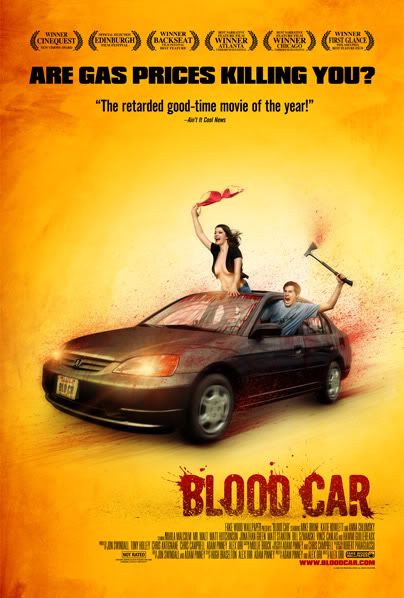Met a couple of interesting folks here in the Budweiser Brewhouse in Atlanta Hartsfield airport. Alex Orr and friend work in the film industry in Los Angeles. Alex has produced a movie called Bloodcar which was pirated a week before release, and he couldn’t be happier.
In the hard world of independent film production, it is near impossible to get a good piece of work seen, much less make any money at it. Because his film was ripped into digital format and placed up on BitTorrent and other file sharing media, Bloodcar has developed a following and Alex has sold DVDs and merchandising that he would have never done if he could have locked down the film to a “pay-only” format.
This plays directly into a long-held belief I have had about proper capitalism. There is an incorrect belief among many in the producer and consumer worlds that capitalism works best when you cheat the consumer, abuse the worker and lie to your dear old mother.
Bullocks.
The truth is that people are naturally decent, naturally honest, naturally fair. It is part of the social contract that stretches back to our earliest primate ancestors and has not been lost despite common cynicisms of today. When business is done based on this truism you enter a trust-based economy, something I think is finding its way into our world a little more every day.
You can test this, too. Take $100 and give it to a person. Tell them that they have to give some of it to a third person, and that person gets to decide if they want to keep what they received or have the entire $100 returned to you. If the second person gives the third person less than $20, there is a greater than 80% likelihood that the third person will refuse it and you will get your $100 back.
Why is this? By the self-interest argument that has been the basis of modern capitalism and economics for most of the last century, the second person should give the third person $0.01, and the third person should say “a penny is better than nothing” and keep it. But that stretches the natural perception of a Fair Deal.
I have tried this myself, in 1998, on as large a capitalist scale as is reasonably possible. Presented with a licensing issue that caused undue grief with the Cisco PIX firewall products, I had the license enforcement ripped out and told the world. “You can buy the $16,000 license and use the product in full $40,000 mode, but you are supposed to buy a license upgrade when you pass the given usage points.”
Three years later, the percentage of license upgrade purchases as compared to overall sales was precisely the same, which by that point amounted to millions of dollars per month.
I have been arguing this point with the music and creative industries for close to twenty years. “Why not put your songs online, instead of only trying to sell tapes/CDs after bar gigs?” In the first half of the nineties it was a resounding “Hell No!” in response. “This is my stuff, and I will make people pay to hear it!” The RIAA is to this day trying to sue its customers into submission. Today, however, more and more artists are realizing that by assuming a trust relationship with their customers they can have an advantage over the embedded powers, moreover they stand a chance of getting their product experienced out in the world. If the product is good, they will come.
I think there is a deeper lesson in all of this. In a more information-rich market – like what the world is becoming with ubiquitous access to everything – it is more than ever the case that the producers who enter into a trust relationship with their consumers will do well. As the global economy shudders under what is at its base nothing more than a lack of confidence – a loss of trust – may perhaps be seen the roots of a new global economy.
A trust-based economy.
Dawn here at the Brewhouse knows all about this. As she serves food and drink to the weary travelers she talks to them honestly, and she is rewarded for it with tips and invitations to visit with her loyal customers. When the CEOs of more companies learn what Dawn and Alex already know, they will find the doorway to the trust-based economy.
When I get back to the hotel tonight and off of this slow aircard connection, I am going to spend $8 (refundable against the purchase of a DVD) and download Bloodcar. I trust that it will be worth it.

10 comments